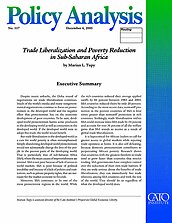But trade liberalization in the developed world as a cure for world poverty is often overemphasized. Simply abandoning developed-world protectionism would not substantially change the lives of the people in the poorest parts of the developing world. That is particularly true of sub-Saharan Africa (SSA), where the main causes of impoverishment are internal. SSA is not poor because of lack of access to world markets. SSA is poor because of political instability and because of a lack of policies and institutions, such as private property rights, that are necessary for the market economy to flourish.
Moreover, SSA continues to be one of the most protectionist regions in the world. While the rich countries reduced their average applied tariffs by 84 percent between 1983 and 2003, SSA countries reduced theirs by only 20 percent. According to the most recent data, nontariff protection in the poorest countries of SSA is four times greater than nontariff protection in rich countries. Strikingly, trade liberalization within SSA could increase intra-SSA trade by 54 percent and account for over 36 percent of all the welfare gains that SSA stands to receive as a result of global trade liberalization.
It is hypocritical for African leaders to call for greater access to global markets while rejecting trade openness at home. It is also self-defeating, because domestic protectionism contributes to perpetuating African poverty. Research shows that countries with the greatest freedom to trade tend to grow faster than countries that restrict trading. SSA governments have complete control over the reduction of their own trade barriers. If they are truly serious about the benefits of trade liberalization, they can immediately free trade relations among SSA countries and with the rest of the world. They should do so regardless of what the developed world does.


